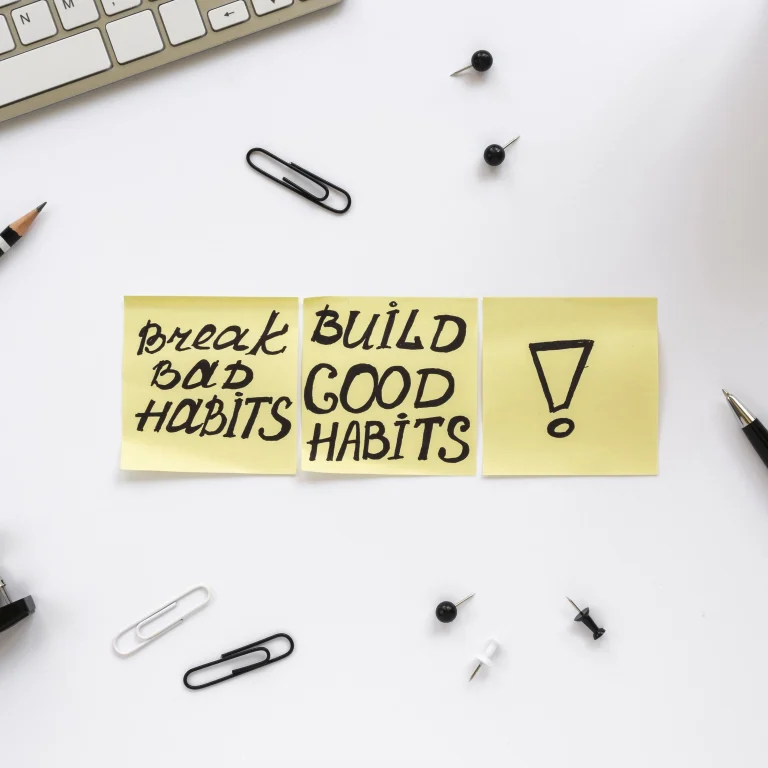“I’ll do it tomorrow.”
How many times have you said (ahm ahm lied) this to yourself? Let’s be honest that tomorrow rarely arrives. And that’s exactly why some things from my to-do notes are from two years ago. If you dig deeper you will find yours too.
Maybe there’s a book you’ve been meaning to read, a project you’ve been excited to start, or even just cleaning the house – but somehow, it never gets done. It’s like the enthusiasm fades away, leaving things unfinished and goals unfulfilled.
A whopping 92% of people don’t achieve the goals they set. It’s easy to get caught up in the excitement of starting something new, only to see it gather (sometimes literal) dust later.
But here’s the good news: you can change that!
How do you ask? Procrastination could be at fault here.
A friendly reminder: Sometimes, there might be other things keeping you from working, like a mental health issue or a tough headspace. If you think you need help or are just curious, please, please reach out and get the support you deserve. You’re worth it!
So if you’re ready to break free from procrastination and start finally working on that age-old to-do list, this blog is for you. Alright let’s hang out together and by the end, you’ll have some practical tips to try out.
I promise, it’s worth it. 🙂
BTW What Exactly is Procrastination?

So, what is procrastination anyway? Simply put, procrastination is when you delay or put off tasks that you should be doing. It’s that little voice in your head saying, “I’ll do it later,” even when you know you should start now.
We’ve all done it at some point – maybe it’s scrolling through social media instead of working, or watching just one more episode of a show instead of studying. Procrastination isn’t about being lazy; it’s more about avoiding tasks that seem difficult or boring.
How to Know if You are a Procrastinator?
You know, procrastination isn’t always obvious, and sometimes it can disguise itself as other behaviors. So how do you know if you’re a procrastinator?
Here are a few signs with checkboxes for a quick analysis:
Signs of Procrastination
Did you notice the checkboxes? Hope that helps 😉
Constantly Delaying Tasks: Do you find yourself pushing tasks to the last minute, even if you had plenty of time to do them?
Making Excuses: Are you always finding reasons to avoid starting a task? “I work better under pressure” or “I need more time to think” sound familiar?
Feeling Overwhelmed: Does the thought of starting a big project make you feel anxious or stressed, so you end up doing nothing at all?
Easily Distracted: Do you start working on something important, but quickly get sidetracked by less important activities?
Regretting Delays: Do you often regret not starting earlier once you finally get around to finishing a task?
Putting Things Off: Do you find yourself delaying tasks even when you have the time to do them?
Making Excuses: Do you often come up with reasons why you can’t start a task right now?
Feeling Overwhelmed: Do you feel stressed or anxious when faced with a task, leading you to avoid it altogether?
Getting Distracted Easily: Do you find yourself easily distracted by other activities when you should be working on something important?
Procrastinating on Important Tasks: Do you tend to procrastinate on tasks that are important to you, like work assignments or personal goals?
If you checked some of the boxes off, you might be dealing with procrastination. But don’t worry – recognizing it is the first step to overcoming it.
Self-Assessment Techniques for Detailed Analysis
- Journaling: Keeping a journal can help you track your thoughts and behaviors, allowing you to identify patterns of procrastination.
- Time Tracking: Use a timer or app to track how you spend your time throughout the day. This can help you see where you might be wasting time or avoiding important tasks.
- Reflection: Take some time to reflect on your procrastination habits. Ask yourself why you might be avoiding certain tasks and what you can do to overcome them.
Differentiating Between Procrastination and Strategic Delay
It’s important to note that not all delays are procrastination because some of us are smart people and they delay the tasks strategically. It allows you to gather more information or approach the task more effectively later on.
The key difference lies in the intention behind the delay. Procrastination involves avoiding tasks out of fear, anxiety, or a lack of motivation, while strategic delay involves a conscious decision to postpone a task for valid reasons.
By being aware of these signs and self-assessment techniques, you can start to identify procrastination in yourself and take steps to overcome it.
But wait, humans are smart, so why do we procrastinate?
Causes of Procrastination
a. Fear of Failure
b. Perfectionism
c. Lack of Motivation
d. Poor Time Management
e. Overwhelming Tasks
f. Distractions

It turns out there are several reasons why you might keep putting things off. Let’s take a closer look at some of the most common causes:
a. Fear of Failure
There are some people who love the unknown, but for some of us the thought of failure could be bitter. Fear of failure can be paralyzing. We worry that we won’t do a good job, so we avoid starting altogether.
It’s like thinking, “If I don’t try, I can’t fail.”
b. Perfectionism
Perfectionism sounds like it should be a good thing, right? But aiming for perfection can actually hold you back. If you set unrealistically high standards for yourself, you might feel that anything less than perfect isn’t worth doing. This often leads to doing nothing at all because the pressure to be perfect is too much.
c. Lack of Motivation
What’s that saying? A bored mind is the devil’s house that says “I don’t want to do this now?”
Sometimes, there is no spark between you and the task at hand. If you are not interested or don’t see the instant value in what you need to do, it’s easy to push it aside. Lack of motivation can make even the simplest tasks feel like a chore.
d. Poor Time Management
Ever felt like there aren’t enough hours in the day? Poor time management can lead to procrastination when we don’t plan our tasks well. Without a clear plan, it’s easy to let time slip away and leave everything until the last minute.
e. Overwhelming Tasks
Imagine a big pile of laundry. You can see the “I’ll do it tomorrow” coming from far away. Big goals can be intimidating. When a task feels too large or complex, we might not know where to start. This feeling of being overwhelmed can make us put off starting altogether because we can’t see a clear way forward.
f. Distractions
And then there are distractions. In today’s world, they’re everywhere! From social media notifications to unexpected phone calls, it’s so easy to get sidetracked.
And if you have made it so far without getting distracted, I am so proud of you 🙂
Distractions can break your focus and lead you to procrastinate, especially if you’re already feeling hesitant about the task at hand.
Two Types of Procrastination
Procrastination can actually show up in different forms in our life. Believe it or not, not all procrastination looks the same. Here are the two main types:
a. Passive Procrastination
Passive procrastination is when we avoid tasks and end up doing nothing instead. The “I will do it later” comes under this type. Here are a few examples I can remember from my life:
- Avoiding Homework: A big assignment was due, but I kept finding other things to do instead. Almost cleaned your room, watched TV, or just daydreamed. Anything but starting that homework!
- Dodging Chores: One weekend I planned to clean the house but ended up binge-watching my favorite series instead. Kept telling myself, “I’ll start after this episode,” but never did. Oops.
b. Active Procrastination
Active procrastination is when you choose to delay tasks on purpose because you believe you work better under pressure. While it might sound productive, it can still be risky.
Here are some stories you might resonate with:
- Last-Minute Projects: Think about the times you had a project due at work or school and waited until the night before to start. You told yourself you’d get it done faster if you were under the gun. Maybe you pulled an all-nighter and finished just in time, but the stress was through the roof!
- Cramming for Exams: Remember those late-night study sessions before a big exam? You convinced yourself that cramming all the information in one go would be more efficient than studying a little each day. Sure, you might have passed the exam, but at what cost to your sanity and sleep?
Recognizing which type of procrastination you’re dealing with can help you find the right strategies to overcome it.
Ready to learn more about the effects of procrastination and how to beat it? Let’s keep going!
Effects of Procrastination
a. Impact on Mental Health
b. Impact on Productivity
c. Impact on Relationships
d. Statistical Data and Research Findings
Procrastination might seem harmless at first, but it can have some serious effects on our lives. Let’s look at how it impacts us mentally, physically, and socially, along with some eye-opening statistics and research findings.
a. Impact on Mental Health
- Stress and Anxiety: Putting off tasks until the last minute can create a lot of unnecessary stress. The pressure to finish on time can lead to anxiety, making it even harder to focus and complete the task.
- Depression: Chronic procrastination can contribute to feelings of guilt and low self-esteem. Over time, this can lead to depression, as we constantly feel like we’re failing to meet our own expectations.
If you are experiencing any of this then please please seek help. We love and care for you.
b. Impact on Productivity
- Lower Quality of Work: Rushing to finish tasks at the last minute often means we don’t do our best work. There’s no time to review or improve, so the quality suffers.
- Missed Opportunities: Procrastination can cause us to miss important deadlines and opportunities. Whether it’s a job application, a project at work, or a personal goal, delaying can mean losing out on valuable chances.
c. Impact on Relationships
- Frustration and Resentment: When you procrastinate, you might let others down by not fulfilling your commitments. This can lead to frustration and resentment from friends, family, and colleagues.
- Reduced Trust: Consistent procrastination can make others see you as unreliable. Over time, this can damage relationships and reduce the trust others have in you.
d. Statistical Data and Research Findings
- 92% of People Don’t Achieve Their Goals: Studies show that a staggering 92% of people don’t achieve the goals they set for themselves, often due to procrastination.
- Increased Stress Levels: Research from the American Psychological Association indicates that procrastinators report higher levels of stress and poorer well-being.
- Lower Academic Performance: According to a study published in the journal Frontiers in Psychology, students who procrastinate tend to have lower grades and higher dropout rates compared to their non-procrastinating peers.
Procrastination might feel like a small habit, but it can have big consequences. The good news is, with the right strategies, you can overcome it and improve your lives significantly.
Strategies to Overcome Procrastination
a. Setting Clear Goals
b. Breaking Tasks into Smaller Steps
c. Prioritizing Tasks
d. Using Time Management Techniques
e. Creating a Conducive Environment
f. Minimizing Distractions
g. Building Self-Discipline

When it comes to beating procrastination, having a solid plan in place can make all the difference.
Here are some effective strategies to help you stop procrastinating and start taking action:
a. Setting Clear Goals
- Goal Planning: Picture this: you’re on a road trip. You wouldn’t just hop in the car without a destination, right? Same goes for your goals. Take some time to map out where you want to go and how you’ll get there. You can get our goal setting cheat sheet to make this easier.
- SMART Goals: Be smart and set SMARTer goals. Make them Specific, Measurable, Achievable, Relevant, and Time-bound. This will help you stay focused and track your progress effectively.
b. Breaking Tasks into Smaller Steps
- Sometimes, tasks can feel overwhelming. Break them down into smaller, more manageable steps into bite-sized pieces. Trust me, it’s much easier to tackle a bunch of small tasks than one big, scary one.
c. Prioritizing Tasks
- Urgent vs Important: Identify the most important tasks on your to-do list and prioritize them accordingly. Focus on completing high-priority tasks first to ensure progress towards your goals.
d. Using Time Management Techniques
- Pomodoro Technique: Imagine you’re training for a marathon. You wouldn’t sprint the whole way, right? Work in short focused sessions followed by short breaks. This can help improve productivity in life and focus.
- Time Blocking: How about a magical time-turner like Hermione? Assign specific blocks of time for your tasks or projects.
e. Creating a Conducive Environment
- Your corner: Find your zen zone. Create a space where you can work without distractions. It could be a cozy corner of your room or a café down the street, find what works for you.
f. Minimizing Distractions
- Distraction Detox: Let’s be real – distractions are everywhere. Social media, Netflix, that pile of laundry calling your name. Take control! Turn off notifications, set boundaries, and reclaim your focus.
g. Building Self-Discipline
- Accountability: Remember the buddy system from school? It works for adults too! Share your goals with a friend or family member who can cheer you on and keep you in check.
- Focused Sessions: Schedule dedicated blocks of time for focused work. Eliminate distractions and commit to working on one task at a time.
- Awareness: Tune in to your inner procrastinator. Notice when it starts creeping in and try to nip it in the bud. Recognize the triggers and patterns that lead to procrastination.
Remember, Rome wasn’t built in a day, and neither are good habits. Take it one step at a time, and before you know it, you’ll be a procrastination-fighting machine!
You’ve got this!
Psychological Techniques to Overcome Procrastination
a. Cognitive-Behavioral Strategies
b. Positive Reinforcement
c. Visualization and Mental Contrasting
d. Relevant Psychological Theories and Techniques
Alright, let’s dive into the fascinating world of psychology and explore some techniques to outsmart that sneaky procrastination monster. Get ready to flex those mental muscles!
a. Cognitive-Behavioral Strategies
Ever catch yourself thinking, “I’ll never get this done”? It’s time to flip the script! Cognitive-behavioral techniques help us challenge those negative thoughts and replace them with more positive ones. It’s like turning “I can’t” into “I can and I will!”
b. Positive Reinforcement
Remember when you were a kid and got a gold star for doing something awesome? Turns out, positive reinforcement works for adults too! Reward yourself for making progress towards your goals. Whether it’s a small treat or some well-deserved downtime, celebrate those wins!
c. Visualization and Mental Contrasting
Close your eyes and imagine yourself crushing your goals. Visualize what success looks like and how it feels. Now, here’s the kicker – pair that with a reality check. What obstacles might you face along the way? By mentally contrasting the positives and negatives, you’ll be better prepared to overcome challenges.
d. Relevant Psychological Theories and Techniques
- Zeigarnik Effect: It’s the tendency to remember incomplete tasks more than completed ones. Knowing this, you can use it to your advantage by starting tasks and creating a sense of momentum.
- Yerkes-Dodson Law: It suggests that there’s an optimal level of arousal for performance. Too little arousal (like boredom) or too much (like panic) can hinder our ability to get things done. Find your sweet spot.
Consider these strategies as your advanced toolkit in the battle with procrastination. It’s like having a secret weapon up your sleeve – except everyone knows about it, and they’re cheering you on!
Tools and Resources

Alright, let’s talk about some handy tools and resources that can supercharge your efforts to beat procrastination. From apps to books, we’ve got you covered!
- Accountability Partner: One thing that really worked for me when working on some personal projects was getting an accountability partner who could help me reach the finish lines.
- Time Management Apps: Time management apps are the next best thing to personal assistants!
- Task Management Tools: Say goodbye to sticky notes scattered all over your desk! Task management tools can help you keep all your tasks and projects in one place.
We even created a simple task list maker with a progress bar, give it try?
- Focus Apps and Extensions: Need a little extra help staying focused? There’s an app for that! Focus apps and browser extensions like Forest or StayFocusd can block distracting websites and help you stay on task.
- Time Tracking Software: Ever wonder where all your time goes? Time tracking software can help you find out! Whether you’re freelancing or just curious about your daily habits, these tools can give you insights into how you spend your time.
- Self-Improvement Books: Looking for some inspiration? Dive into a self-improvement book! From motivation to mindfulness, there’s a book out there for every procrastinator looking to level up their game.
- Online Courses and Workshops: Ready to take your skills to the next level? Online courses and workshops offer a wealth of knowledge on everything from time management to goal setting. Plus, you can learn at your own pace from the comfort of your home.
- Supportive Communities: Ever feel like you’re going it alone? Join a supportive community of like-minded individuals who will be your buddies on the way.
- Personal Development Podcasts: Need a pick-me-up on your morning commute? Tune into a personal development podcast!
With these tools and resources at your fingertips, you’ll be armed and ready to tackle procrastination head-on. So go ahead, download that app, pick up that book, and join that community – your future self will thank you for it!
Wrapping Up
We’ve covered a lot of ground on this journey to overcome procrastination, haven’t we? Let’s wrap things up and take a moment to reflect on everything we’ve learned.
Recap of Key Points
- Understanding Procrastination: We started by recognizing what procrastination is and how it shows up in our lives. We’ve all had those moments of “I’ll do it tomorrow,” but now we know how to spot them.
- Identifying Causes: From fear of failure to distractions, we dug deep into why we procrastinate. Knowing the root causes helps us tackle the problem head-on.
- Personal Stories: We shared personal anecdotes and testimonials that showed us we’re not alone in this struggle. Real-life stories of overcoming procrastination remind us that change is possible.
- Effective Strategies: We talked about setting clear goals, breaking tasks into smaller steps, prioritizing, and using time management techniques like the Pomodoro Technique and time blocking.
- Psychological Techniques: We touched on cognitive-behavioral strategies, positive reinforcement, and visualization to help shift our mindset and build habits that stick.
- Tools and Resources: We explored various apps, books, and communities that can support us in our journey to beat procrastination.
Final Encouragement
Now, it’s time to take everything we’ve learned and put it into action. Remember, overcoming procrastination isn’t about being perfect; it’s about making progress. It’s about taking small, consistent steps towards your goals and celebrating your victories along the way.
Think about this: What’s one small step you can take today to move closer to your goals? Maybe it’s setting a timer for a focused work session, or breaking a big task into smaller chunks. Whatever it is, start now.





